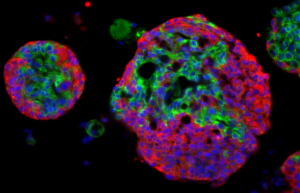Research:
PRECISION MEDICINE
Breast cancer has led the precision oncology field, with the first targeted therapy, tamoxifen, and the associated companion biomarker ER, as well as the second targeted therapy, Herceptin, with HER2 as a biomarker. Breast cancer also had the first multigene prognostic test (OncotypeDx) which has transformed care for early breast cancer, and research into molecular subtyping (intrinsic subtypes) has provided knowledge on mechanism of development and treatment (Nasrazadani, 2018). In addition to his role as principle investigator in the Lee/Oesterreich Lab, Adrian is also Director of the Institute for Precision Medicine at the University of Pittsburgh.

We are analyzing the performance of current diagnostic and prognostic assays and developing new tests. We reported on the spatial heterogeneity of five prognostic tests in early breast cancer and effects on prognostication (Gyanchandani et al., 2017; Gyanchandani et al., 2016; Smith et al., 2019). We developed a new targeted sequencing panel, MammaSeq, for specific detection of breast cancer mutations in solid breast cancers and liquid biopsies (Smith et al., 2019).
Our current work focuses on liquid biopsy testing in advanced breast cancer. We collect plasma from every consented patient with advanced breast cancer at UPMC Magee Women’s Hospital at every progression and are examining genomic changes using next generation sequencing. Another focus area is the development, characterization and use of organoids developed from clinical specimens of both primary and metastatic breast cancer. We are applying state-of-the art techniques such as single cell sequencing and spatial analyses in order to understand intratumor heterogeneity and interaction between tumor cells and the tumor cell microenvironment.
Endocrine Resistance | Invasive Lobular Breast Cancer | Breast Cancer Metastasis
Gyanchandani, R., Kota, K. J., Jonnalagadda, A. R., Minteer, T., Knapick, B. A., Oesterreich, S., Brufsky, A. M., Lee, A. V., and Puhalla, S. L. (2017). Detection of ESR1 mutations in circulating cell-free DNA from patients with metastatic breast cancer treated with palbociclib and letrozole. Oncotarget 8, 66901-66911.
Gyanchandani, R., Lin, Y., Lin, H. M., Cooper, K., Normolle, D. P., Brufsky, A., Fastuca, M., Crosson, W., Oesterreich, S., Davidson, N. E., et al. (2016). Intratumor Heterogeneity Affects Gene Expression Profile Test Prognostic Risk Stratification in Early Breast Cancer. Clin Cancer Res 22, 5362-5369.
Nasrazadani A, Thomas RA, Oesterreich S, Lee AV. Precision Medicine in Hormone Receptor-Positive Breast Cancer. Front Oncol. 2018 May 4;8:144.
Smith, N. G., Gyanchandani, R., Shah, O. S., Gurda, G. T., Lucas, P. C., Hartmaier, R. J., Brufsky, A. M., Puhalla, S., Bahreini, A., Kota, K., et al. (2019). Targeted mutation detection in breast cancer using MammaSeq. Breast Cancer Res 21, 22.

